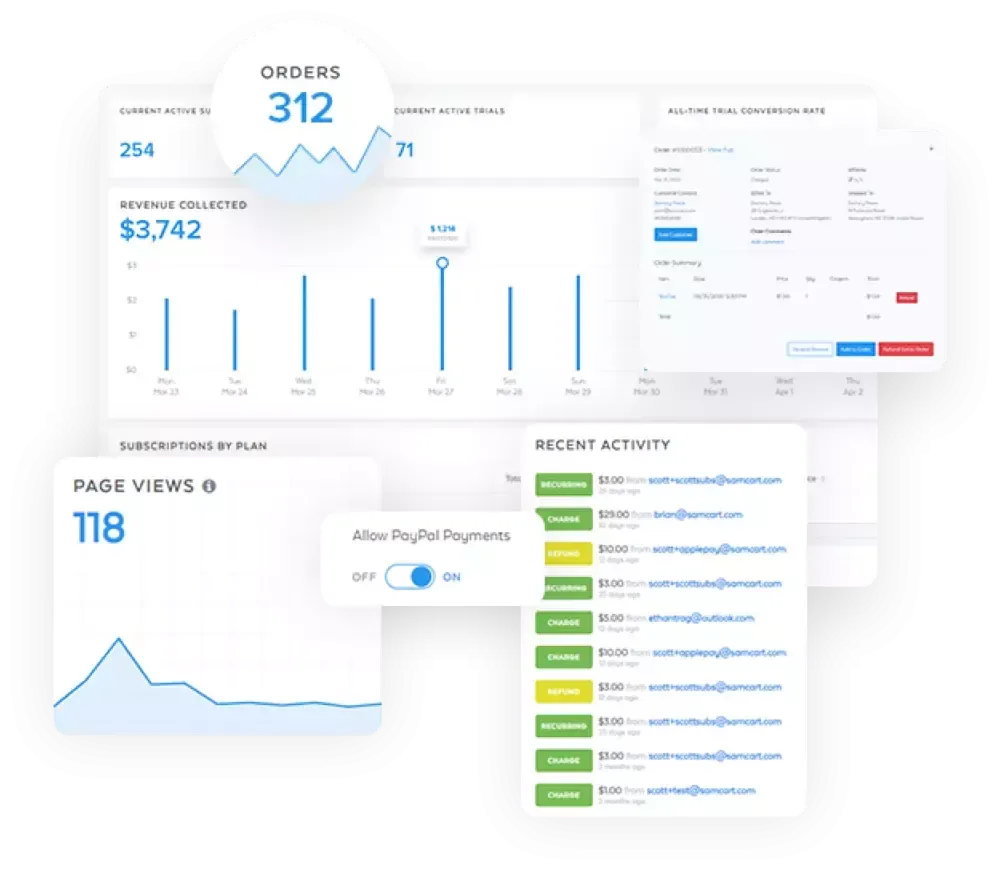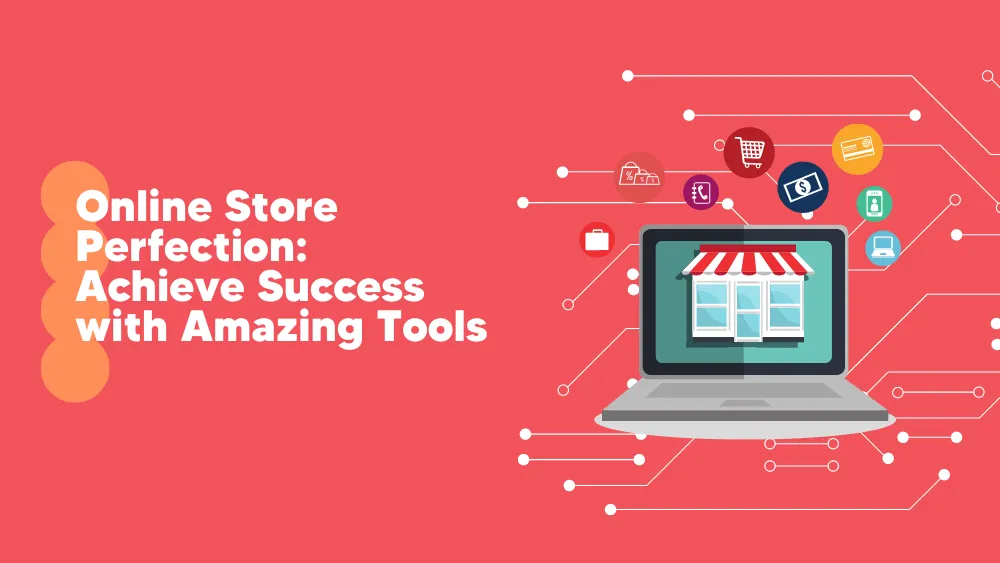
SamCart Reviews for 2026
Save 40% on your SaaS stack with expert guidance
Free Consultation
What is SamCart?
SamCart is a premier e-commerce platform designed to optimize the checkout experience for online businesses. Tailored for entrepreneurs and product creators, SamCart focuses on simplifying the sales process by offering high-converting checkout pages that can be embedded anywhere.
Its “Checkout Anywhere” feature allows merchants to sell directly from live streams, social media, or any online platform, enhancing the customer’s buying journey.
A standout feature is its one-click upsells and downsells, which help maximize revenue by offering additional products or services during the checkout process. The platform also boasts a vast array of integrations, seamlessly connecting with popular marketing, payment, and business tools.
With its in-depth reporting capabilities, SamCart provides actionable insights into sales performance, helping businesses make informed decisions.
In essence, SamCart streamlines the end-to-end selling process, making it a go-to choice for modern online retailers.
Found in these Categories
Best For
- StartUps
- Freelancers
- Small Business
- Medium Business
SamCart Alternatives
SamCart Pricing
Launch
Grow
Scale
Looking to Save Time & Money
Audit, consolidate, and save—powered by our internal buying team. Let our experts analyze your current software stack and identify opportunities for cost savings and efficiency improvements.
- Stack Audit
- Cost Reduction
- Expert Team
SamCart Features
- Order Management
- Abandoned Cart Saver
- Credit Card Processing
- Discount Management
- Tax Management
- eCommerce Management
- Refund Management
SamCart Integrations
-

Zapier
Data Integration Software
-

HubSpot CRM
CRM Software
-

ShipStation
Dropshipping Software
-

Klaviyo
Marketing Automation Software
-

MaroPost
Marketing Automation Software
-

MailChimp
Marketing Automation Software
-

GetResponse
Email Marketing Software
-

Drip
Marketing Automation Software
-

Constant Contact
Email Marketing Software
-

AWeber
Email Marketing Software
-

Keap
CRM Software
User Sentiment - SamCart Reviews
-
Ease of Use
Many users highlight SamCart’s simple and intuitive interface, making it accessible even for beginners. The platform offers customizable checkout templates, making it easy to build attractive sales pages quickly.
-
Sales Boosting Features
SamCart excels at features that maximize sales value, such as order bumps, one-click upsells, and A/B testing. These tools are effective for increasing revenue per transaction, which has made a significant difference for users running online businesses.
-
Customer Support
The platform receives praise for its responsive and helpful customer support. Users noted that the support team goes the extra mile to assist with setting up features and solving issues.
-
Custom Checkout Pages
One of SamCart’s key strengths is its high-quality, customizable checkout pages. Users find these pages visually appealing and effective in converting visitors into buyers.
-
Payment Processing
SamCart integrates well with major payment platforms like PayPal and Stripe, making it easy for businesses to manage transactions.
-
Pricing Structure
A common criticism is that SamCart’s pricing can be steep, especially when considering some features, such as retrying failed payments, are only available on higher-tier plans (e.g., $159/month).
-
Learning Curve
Although many find it user-friendly, some users noted that getting the full value out of SamCart’s advanced features can require a more substantial time investment than advertised.
-
Upsell Management
Some users experienced frustration with managing upsells, particularly in terms of how they were handled within the customer journey.
-
European Payment Processing Issues
There are reports from users in Europe about the lack of 3D secure card processing, which led to security concerns for transactions.
Leave a Review
SamCart Company Details
Company Name
SamCart Inc.
Headquarters
United States
Website
www.samcart.com
Own this Software?
SamCart vs. Similar Products
Select up to 3 Software, to enable Comparison
Compare Selected SoftwareEditorial Review: SamCart Deep Dive
Table of Contents
Starting an online business is a challenging task. The first step involves creating a well-defined website and integrating payment options to provide customers with an easy checkout experience. SamCart is an e-commerce platform that allows you to sell digital products.
This service is specifically designed for entrepreneurs, course creators, and businesses that want to start selling their products with an easy-to-use platform.
SamCart is a Direct-To-Consumer e-commerce platform that offers a simple way to create a product page, integrate payment options, and start selling. In this SamCart review, we will take a closer look at what SamCart is, its features, functionality, and the SamCart affiliate program.
The basic definition of what is SamCart
SamCart is a web-based e-commerce platform that simplifies the process of selling digital products. It provides you with all the necessary tools to bring your product to life. SamCart’s template-driven philosophy enables you to use pre-defined templates for product pages, checkout pages, and sales pages.
You can easily customize these templates according to your requirements using SamCart’s drag-and-drop builder. No coding skills are needed. Additionally, all templates are 100% mobile responsive.
SamCart – e-Commerce platform
Creating your first product page can be overwhelming. In addition to designing the page, you also need to ensure that it effectively drives sales.
SamCart offers a wide range of features that enable users to build product pages, incorporate one-page funnels, process additional payments, and implement upsell and down-sell strategies. In this SamCart review, we will examine how SamCart can assist you in selling digital products, increasing customer value, and enhancing conversions. We will also delve into their SamCart affiliate feature.
About SamCart
With SamCart, you have the power to sell virtually any product or service, from online courses and membership sites to eBooks, consulting, coaching, and more!
Furthermore, SamCart provides your customers a range of payment options, including recurring payments, free and paid trials, one-time payments, and payment plans. You can even allow users to pay as they like, allowing them to explore your offerings without any financial commitment.

Once your website is created, you can share it with your potential clients using a simple URL. SamCart also makes it easy to manage the site by providing a helpful dashboard that streams your sales and their source live stream. You can also run A/B testing to find out what works best for you!
SamCart integration is also well done. They offer integration with most of the tools you are already using. You can also automate tasks using their integration options.
Lastly, SamCart offers a conversion boost guarantee where you do not have to pay anything if it doesn’t pay for itself in 30 days.
Is SamCart a payment processor?
No, SamCart is not a payment processor. However, you can connect SamCart with other payment processors, including PayPal and Stripe. It creates a conversion-driving bridge so that you can connect other payment processors to the SamCart platform.
Can you use SamCart for affiliate marketing?
Yes, you can use SamCart for affiliate marketing. However, it is not a complete affiliate marketing solution. It automatically generates an Affiliate Signup Page. This way, affiliate marketers can sign up and start promoting your products.
The affiliate tab is also shown on the top navigation bar. From there, you need to scroll down until you find the affiliates tab. There, you will find the link to your Affiliate Signup Page.
For affiliates, this means filling up the form for approval. Once they submit the request, you will get notified about it in the backend under Pending Approval.
SamCart Login: Easy Access to Your Business
Logging into SamCart gives users immediate access to the platform’s dashboard, where they can manage products, create customized checkout pages, track sales, and handle customer subscriptions.
The SamCart login process is simple, secure, and can be accessed from any device. Once logged in, users can navigate the CheckoutOS tools, monitor course sales through the Courses App, and take advantage of upsell features, all from a centralized dashboard.
SamCart Features Detailed
To learn more about SamCart, we need to go through its features. Let’s get started.
Sales Page Design Features
Everything starts from designing your sales page. SamCart offers all the key features so do not need to write a single line of code.
-
Drag and Drop Builder
At the core of SamCart, you will find their drag-and-drop builder. It offers an easy way to create your product page. To get started, you must open a product and launch the content builder. From there, you are free to choose the template of your choice. If you are confident, you can also select an empty template.
Once selected, you will find the option to launch the drag-and-drop builder. The drag-and-drop builder comes with all the core elements.

You also get access to widgets that let you add additional functionality to the page. For example, you can easily add headlines or add buttons to improve your product page.
You can also add testimonials and FAQs to improve the page’s usability for the visitor. You also get access to collections which are pre-defined sections of the page.
The core elements and widgets offered by drag and drop builder include:
- Widgets: Countdown, testimonial, FAQ & HTML, progress bar and guarantee
- Core Elements: Divider, bullet, headline, image, video, text & button.
-
Pre-designed template
SamCart offers an exclusive collection of pre-defined templates and layouts. Each template is unique in its own way, and you can use it to customize your product and checkout pages.
You can add pages to your products. To do so, you need to go to Checkout Design for your product and start creating product pages. These pre-designed templates take full advantage of the drag-and-drop builder. The templates are 100% responsive and hence mobile-ready.
CheckoutOS
SamCart’s CheckoutOS is a proprietary technology designed to optimize the checkout process for increased conversions. It enables businesses to create highly customizable checkout pages that load quickly and can be tailored to fit brand needs.

CheckoutOS offers tools like one-click upsells, advanced A/B testing, and seamless integrations with payment processors and third-party apps, allowing for streamlined operations. Additionally, it provides built-in tools for reducing cart abandonment, helping businesses capture more sales by enhancing the overall shopping experience.
-
Unlimited products
SamCart lets you create unlimited products! There are no limitations on this part.
-
Localization
To help local sellers, SamCart also supports localization. This means that you can set the currency to the local offering.
-
Digital Wallets
Digital wallet support can help you sell your products better. SamCart offers purchases via Google Pay, Apple Pay, and others, making it easy for customers to make one-touch payments.
-
Custom Domains
SamCart also lets you set custom domains for your product pages. For example, you can get rid of smarcart.com in your page URL or checkout page with custom domains. The approach is crucial as it lets you better connect with your audience and instills trust in your audience.
To use the feature, you need to register a domain and set it up with Cloudflare. Once you’ve done this, you need to add a CNAME record within Cloudflare DNS. Lastly, you must enable SSL and then add the custom domain to SamCart.
Revenue Optimization
As SamCart is an eCommerce solution, it also provides excellent revenue optimization features. Let’s discuss them one by one.
-
Pre-purchase order bumps
With SamCart, you can improve your order rate by offering pre-purchase order bumps. The order bumps by allowing customers to add other products before they check out. The choice is provided before the checkout process and appears on every page to help the buyer choose. It improves the customer experience and works well with customers with multiple needs.

For example, you can allow the customer to add a monthly subscription while purchasing an eBook or, better allow them to enroll in a video course.
The order bumps can be shown in a stack, either vertically or horizontally. You can also change the headline and design of the order bumps to customize them according to your brand colors.
-
One-click upsells
One-click upsells also improve your chance your revenue growth. Moreover, one-click upsells the biggest eCommerce players, including Amazon use method.
Basically, with one-click upsells, you present an additional offer to the customer once they purchase with you. They can combine it with their purchase and get benefits from it.
According to SamCart, it improves sales by 70%. Also, you can use your existing products for one-click upsells. Moreover, there are no limitations on the type of products it works on. This means you can use one-click upsells on:
- Video courses
- eBooks
- Physical products
- Coaching programs
- Recurring subscriptions
- Limited payment plans
The one-click upsell feature is entirely customizable, easy to set up, and works great with any business type.
-
Smart pixel tracking
With smart pixel tracking, you can track from where you are getting your orders. This way, you can optimize your sales and target more users from there.
-
A/B testing
SamCart lets you do proper A/B testing on every page. By using A/B testing, you can uncover multiple ways how to increase conversion rates.
-
Add to order
SamCart also offers to Add to Order option so that your customers can easily add new products or services when checking out.
-
Advanced Reporting
With advanced reporting, you also get to learn more about business and get invaluable insights. In addition, SamCart also provides advanced real-time reporting so that you can make real-time decisions to improve sales.
-
Pay what you want (donations)
You can also opt to let customers pay what they want! With Pay what you want(donations), you can let customers be the choice makers. This is great for fundraising or trying to sell a product to a lower-income group. Not only that, but it also strengthens the relationship with customers.
Core Commerce
SamCart also offers excellent core commerce features, which in turn, lets you manage your business. These features include:
-
Advanced subscription
SamCart lets you create advanced subscriptions. You can create free trials, payment plans, and monthly subscriptions. You are also free to use any other subscription model as per your requirement.
-
Taxes and Vat
With SamCart, you can manage all the required taxes associated with sales. You can also configure SamCart to comply with your local state’s compliance requirements.
-
Partial refunds
There are cases where you need to provide partial refunds to the customers. SamCart lets you add a partial refund option for your customers, giving them the option to resolve issues.
-
Integration engine
You can integrate SamCart into your tools and automate your eCommerce website. The integration engine allows users to add a custom If/Then rule. By using the custom rules, you can automate a customer’s journey. These rules then can be set to trigger based on events. For example, you can trigger events based on:
- Product Refund
- Product purchased
- Partially refunded product
- Prospect created
- Product added to others
- Subscription canceled
The integration engine also lets you integrate your application. To do so, you need to move to marketplace settings and then Integration. Now, move to select the application that you want to integrate.
-
Custom fields
Easily add custom fields to your product page and make it easy for your customers to add customization to their orders. For example, you can create fields for size and value and even let the customer choose the delivery date at their convenience.
-
Payment processors
SamCart offers extensive payment processors. For example, you can integrate PayPal or Stripe to accept live payments. Apart from that, they also support digital wallets, Braintree, and Easy Pay Direct.
-
Coupons & discounts
Customers like discounts and coupons. With SamCart, you can easily add coupons/discounts for your customers. This enables your customers to take advantage of it, improving your sales. Users can set the coupons to recurring, one-time, or any other type.
-
CRM integration
You can also add CRM platforms to SamCart. Doing so will allow you to share your eCommerce data with your business tools and platforms.
-
Customer Portal
Enable customers to easily manage their subscriptions, purchases, and other vital information through the customer portal.
Courses App
SamCart’s Courses App is an all-in-one platform for creating, marketing, and delivering online courses. It enables digital creators to design course modules, manage content, and engage students through customizable pages and learning paths.
The Courses App integrates with SamCart’s checkout for seamless purchasing, allowing creators to maximize revenue with upsell options during enrollment. Built-in progress tracking and analytics let instructors monitor student engagement and success, offering insights for course improvement.
This feature is ideal for businesses looking to scale digital learning products efficiently.
Security
SamCart offers excellent security out of the box. In addition, they offer reliable uptime with 99.98% uptime. Also, they offer zero transaction fees, allowing you to make the maximum profit. On the security front, they have SCA, PCI, and GDPR compliance. Lastly, you also benefit from their built-in SSL and PCI compliance.
Affiliate Center
You can improve your sales through affiliate support. SamCart offers an affiliate center. It is a powerful yet simple tool that lets you manage the affiliates for your product/service. So, what features does it offer? It offers:
- Affiliate signup and approval
- Media links and emails
- Affiliate payouts and commission structure
SamCart Cost
SamCart offers three pricing plans for its customers: the Launch plan, the Grow plan, and the Scale plan. All plans come with a 7-day SmartCart trial and industry-leading 99.98% uptime. They also offer a 30-day money-back guarantee.
Moreover, they do not lock businesses into a contract. This means that you can easily downgrade, upgrade, pause, and cancel your subscription according to your needs.
Integrations of SamCart
SmartCart offers excellent automation through its wide range of integration support. SmartCart integrations are categorized by:
- Marketing automation
- Membership
- Page builders
- Payment providers
For example, you can easily integrate emails using SamCart email integrations. Right now, SamCart supports the following email integrations:
- Maropost
- MailChimp
- iContact
- GetResponse
- Constant Contact
- ConvertKit
- AWeber
There are also other SamCart integrations, including:
- Drip
- HubSpot
- OptimizePress
- Kajabi
- Paypal
- Stripe
Does SamCart work with WordPress?
SamCart does work with WordPress. To integrate SamCart into WordPress, you need to use Zapier. Zapier offers an easy way to integrate both platforms, and you can integrate both platforms without writing a single line of code! Some of the well-known triggers and actions include:
- New order
- New subscription cancellation
- Prospect creation
- New Refund
- New comment
- Subscription charged
To integrate SamCart with WordPress, you need to do the following through Zapier:
- Authenticate SamCart with WordPress.
- Next, choose one app as a trigger. It will start the automation process
- Choose the resulting action
- Select the data that needs to be sent from one app to another
Does SamCart integrate with Mailchimp?
Yes, SamCart integrates with MailChimp. With the integration, you can automatically segment customers from SamCart to MailChimp. The integration is done via SamCart’s Integration Engine. The data you receive from SamCart can then further be categorized with automation creation using trigger events in SamCart. For example, the triggers include:
- Product purchased
- Product refunded
- Subscription canceled
- Subscription recovered
SamCart Review Conclusions
SamCart is an excellent shopping cart solution. It allows you to sell digital products easily and offers an easy way to start the product-selling process for bloggers, entrepreneurs, and small businesses. However, if you aim to sell physical products, then SamCart is not for you.
SamCart’s overall features set is also expansive. You get access to a brilliant drag-and-drop editor, which people can use to create product and checkout pages. To aid your product page creation process, SamCart also offers pre-defined responsive templates.
However, SamCart’s pricing can be on the higher side. As a user, you need to pay monthly fees. Also, some features are locked on higher plans which can be a big barrier if you are growing faster than you expected.







